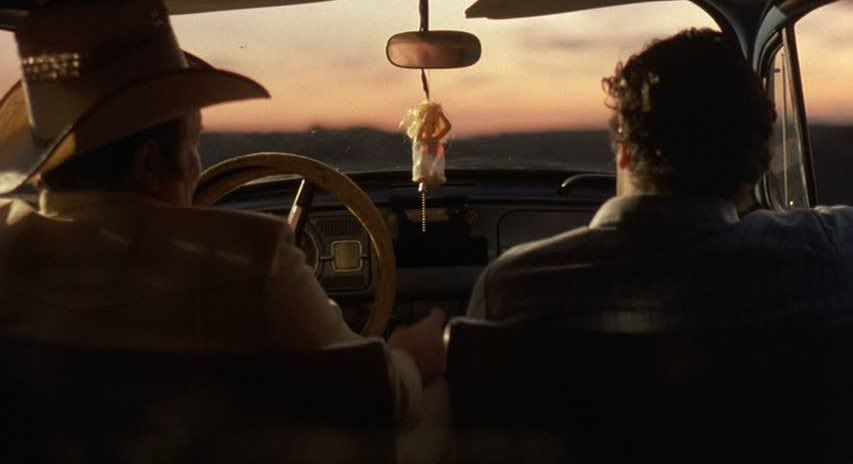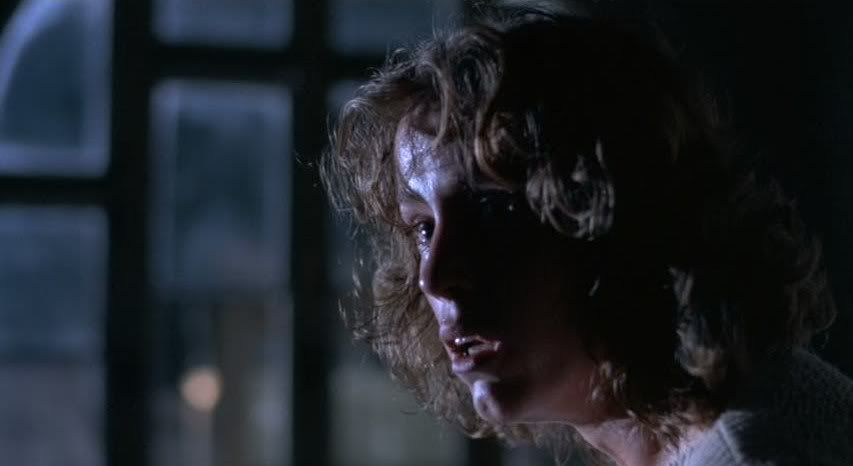
Blood Simple was the first feature of Joel and Ethan Coen, and it's a natural debut for the brothers, a darkly comic/tragic neo-noir that wallows in the greed, pettiness and stupidity of people driven by love and revenge to do terrible things to one another. In the film's opening minutes, Ray (John Getz) is driving Abby (Frances McDormand) away from her nasty, brutish husband Marty (Dan Hedaya), the owner of the bar where Ray works. Ray and Abby's love affair will trigger all of the film's grisly events, in one way or another, and the opening scene is already loaded with menace and the promise of coming tragedy. As Ray and Abby talk in the car, driving at night along a dark highway, they're bathed in pale midnight blue tones, the camera lingering in the backseat of the car, barely catching glimpses of their faces, so that their voices seem disembodied in the darkness. Abby is running away, not sure of where she's going, just sure she doesn't want to be with Marty anymore, and Ray, in his stolid way, simply keeps repeating that he "ain't no marriage counselor," but that he really likes Abby. It's obvious where this is heading, but Ray and Abby keep earnestly, nervously beating around the bush, delaying the inevitable moment when they'll fall into bed together. And the eerie mood of this scene, juxtaposed against the tenderness and vulnerability of the soon-to-be lovers, says all one needs to know about where this story will go once their affair begins.
At least, the broad strokes are apparent from the beginning. But no one could quite predict just how horribly off course this story of revenge and jealousy will go by its end, or just how many weird twists will crop up before the last drops of blood have been shed. When Marty finds out about his wife's infidelity from the slimy, smirking private investigator Visser (M. Emmet Walsh), he hires Visser to kill the lovers for ten thousand dollars. What ensues is a whole string of bloody events, most of them centered around tragic misunderstandings and acts of staggering stupidity. These people — all of them, with the possible exception of the wide-eyed, innocent Abby — are an unfortunate combination of utter incompetence and bloodyminded nastiness, and they go about slaughtering, assaulting and robbing from one another in the most ludicrous ways.
At the base of the film is the notion that people are programmed to think the worst of those around them, and that while this impulse is often proven true, again and again, sometimes it is tragically false. Ray is turned against Abby with ease, doubts planted in his soft head by the hateful words of Marty, who naturally has nothing but bile and spite for his unfaithful wife. What started as a love affair is then plagued by doubts and suspicions, by nasty words and bouts of jealousy founded on phantom fears. The unfortunate Abby barely enjoys a day of her new love before she's subjected to fights and suspicions that suggest that this new relationship is already heading down a path similar to the one that led her to the end with Marty. Abby is, however, one of those rare decent people who sometimes meander haplessly through the Coen brothers' cold, cynical universe. She is a premonition of the decency in McDormand's Marge Gunderson in Fargo, a truly good person despite some flaws, full of energy and vigor, eager to talk and to share her feelings. It's not her fault, one senses, that her wide-eyed ingenuousness inspires distrust and, eventually, hatred in the men she ties herself to. And it's not her fault that these foolish, inept men sloppily plot to kill and destroy one another with her at the center of their plots.

Often, the Coen brothers have been accused of laughing at their characters, holding themselves above the stupid actions of these people, looking condescendingly down on their creations as they stumble about. It's sometimes true, though that cynical attitude is softened, if only slightly, by a countervailing sense that the filmmakers are sympathetic to these characters as well, that they feel bad for these people as they destroy themselves through their base emotions and desires. In this, the Coens' first film, their worldview is perhaps especially clear, and it's obvious that if the filmmakers are laughing at their creations, the laughter is always tinged with a sad awareness of the futility of all this violence. The film opens with voiceover narration by Visser, announcing the film's themes and indeed the themes that would continue to animate the brothers' films throughout their subsequent career:
"The world is full of complainers. And the fact is, nothin' comes with a guarantee. Now I don't care if you're the Pope of Rome, President of the United States or Man of the Year; something can all go wrong. Now go on ahead, y'know, complain, tell your problems to your neighbor, ask for help, and watch him fly. Now, in Russia, they got it mapped out so that everyone pulls for everyone else. That's the theory, anyway. But what I know about is Texas, and down here... you're on your own."
That just about sums up the bleak worldview of the Coen brothers: their characters exist in an amoral universe, derived from film noir's bleak settings, in which everyone is out for his or her self, and one can't rely on help or sympathy from anyone else. Not even from the filmmakers, who watch these characters fumble around from an omniscient, detached viewpoint that suggests a God who's equally amused and disappointed by the follies of these people in their shortsightedness and petty emotions. The murders in the film are purposefully staged so that it's obvious that the characters think they're being clever, that they've planned everything out and have thought of everything. At the same time, the Coens take pains to reveal the opposite: the slip-ups, the stupid mistakes, the missing information. They highlight details like Visser's lighter, or blood spots on a car seat, or a hand touching a surface, sure to leave behind incriminating fingerprints. Again and again, they revisit the bar where the film's first murder takes place, and each time they do, with different characters, things have been changed around and each character tries to understand what has happened, to fill in the gaps in their knowledge. To some extent, the film's tragedy is caused by this lack of understanding, and by the willingness of these misguided fools to leap to conclusions and act rashly anyway.

17 comments:
"laughing at their characters, holding themselves above the stupid actions of these people, looking condescendingly down on their creations as they stumble about."
Precisely.
My antipaty to the Coens begins with the tracking shot across a bar that rises brifly over the passed-put body of a customer then descends again once that space had been passed over. This was very early in the action.
And I walked out.
The Coens are art house hacks. The create stupid characters to put the audience in the position of smug superiority.
I cannot abide this.
I love the Coen bros. and this film certainly an auspicious start for them. But it is true, their films certainly aren't for everyone but BLOOD SIMPLE began a great run of films for them with BARTON FINK arguably being their masterpiece even though THE BIG LEBOWSKI is probably the films of theirs I watch the most.
I also like how in BS, the Coens employed some of the camerawork from Sam Raimi, whom they were close friends with at the time. There are also some really interesting choices in terms of framing, like the scene where, I believe Abby and Ray are talking in front of a screen door and out of nowhere a newspaper slams right into it. It's such a jarring, unnerving effect but works so well in keeping the audience on edge, maintaining the tension that exists for most of the film's running time.
David, while I certainly understand your criticisms of the Coens, I've always thought that, as I say here, they balance their cynicism with real compassion, real regret over the foolish and violent things that people do to one another. Most of their films are inflected with a sense of sadness over the pettiness and brutality of these characters. It's not smug superiority - it's asking us to recognize that so many of the things people do to one another are stupid, and pointless, and vile.
J.D., I certainly agree that this is a fine debut, and the newspaper scene you single out is a great one.
I don't find any real compassion or real regret in their work at all. Just cynicism.
"It's for the kids," you see.
Real compassion: the tender, moving scenes in Fargo between Marge Gunderson and her husband, two genuinely good people trying to carve out a little niche of innocence and love in a cold, nasty world. To me, those scenes, and others like them scattered throughout the brothers' oeuvre, are a very strong argument against the idea that they lack compassion or feeling for their characters. There's much more than simple cynicism in their work and their worldview.
I knew you were going to bring up Marge. She's the exception that proves the rule.
Not surprising being Mrs. Coen and all.
A playful, impressive debut film (made even funnier by the fake DVD commentary, for anyone who hasn't heard it). Have you seen Yimou's remake, Ed? You just reminded me that I need to check it out.
Nope, haven't seen the Yimou film, though I love its JLG-esque US title. You just reminded me of it, too...
As much as they bicker, I think that there is real empathy between the Dude, Walter and Donny in THE BIG LEBOWSKI. There is real warmth under the antagonism which is part of the film's appeal, I think.
Creating characters who are idiots for people to laugh at is new circa the time of Aristophanes. Well, probably not, but things get fuzzier before that. I would imagine a distaste for buffoonery would immediately render a majority of the world's comedy unsavory.
When the Coens reach the level of Aristophanes I'll be sure to let you know.
Oh, so now if you think they're good enough then it doesn't matter whether they 'create stupid characters to put the audience in the position of smug superiority'? There's a hypocritical critic if I've ever seen one. Forgive me if I call a troll a troll.
That's not what I said, dear.
The Coens provide perfect suspense for this film, and although it may not be their best work ever, it still is one of the best directorial debuts. Good Review!
Still my fave Coen Bros film. Recall seeing the trailer before the film hit the cinema and knew I had to see it. Enjoyed your review.
I don't think David's likely to change his opinion on the Coens anytime soon, but there's certainly no reason to call him a troll, Jean; let's be civil, please.
Anyway, thanks for the comments, Jean, CMrok and Steve.
And I agree with J.D. that there's also warmth in the portrayal of friendship in Big Lebowski, and for that matter in O Brother Where Art Thou. Also the heartfelt longing for family that runs through O Brother and Raising Arizona. I see a lot more than just cynicism in the brothers' worldview, even if it isn't necessarily as apparent in a dark neo-noir like Blood Simple.
You're right, I'll just call him a hack and an execcedinly louche womanizer instead, because I wouldn't want to lower myself anywhere below the standard he sets. Well, I'm sure if I dug around a couple more posts I could find the standards dipping ever lower, but that's just this week.
Post a Comment